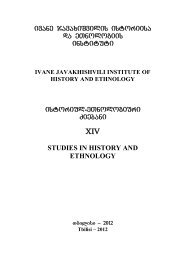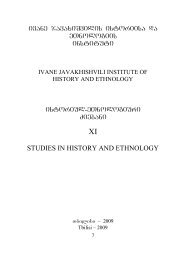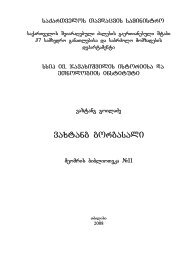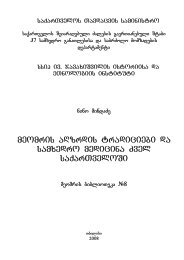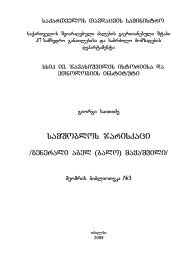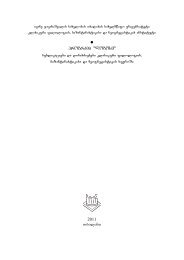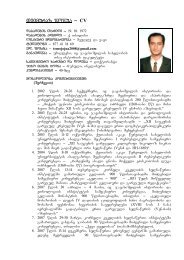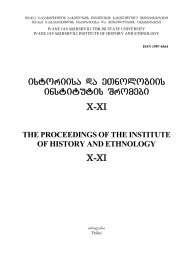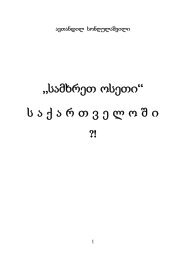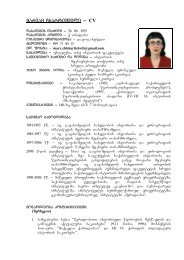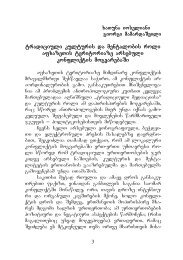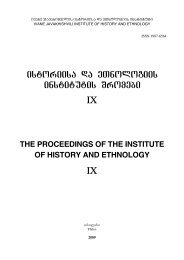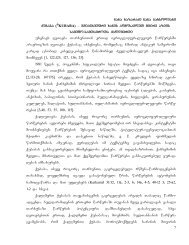- Seite 1 und 2:
ivane javaxiSvilis saxelobis Tbilis
- Seite 3 und 4:
ivane javaxiSvilis istoriisa da eTn
- Seite 7 und 8:
sarCevi gamomcemelTagan ...........
- Seite 9 und 10:
Konstantine Pitskhelauri SOUTH CAUC
- Seite 11 und 12:
EDITORIAL On December 30,2008 the g
- Seite 13 und 14:
15. saqarTvelos muzeumis babilonuri
- Seite 15 und 16:
46. К истории древне
- Seite 17 und 18:
74. Изучение древней
- Seite 19 und 20:
антропологических
- Seite 21 und 22:
137. Экономика и внеш
- Seite 23 und 24:
169. Die alten georgischen Staaten
- Seite 25 und 26:
George Mélikichvili LES "GENS DE S
- Seite 27 und 28:
souvent employé dans le même sens
- Seite 29 und 30:
TAPPĪŠU), les biens doivent être
- Seite 31 und 32:
nino abakelia sakraluri xe da misi
- Seite 33 und 34:
analogiuri simboloebi saqarTvelos s
- Seite 35 und 36:
gonari dRis wina saRamos sanTels de
- Seite 37 und 38:
mxedarTa srbola, romelSic monawileo
- Seite 39 und 40:
nadac is aq gardacvlilisTvis Tanamg
- Seite 41 und 42:
nilia erT SemTxvevaSi kelaptriT anu
- Seite 43 und 44:
After bewailing the sign of the dea
- Seite 45 und 46:
space has its own centre in the fac
- Seite 47 und 48:
amdenadac amjerad kvlevis fokusSi q
- Seite 49 und 50:
waulebis aRwerilobebs vxvdebiT. teq
- Seite 51 und 52:
dros "Tamadad" irCevdnen. Zveli ber
- Seite 53 und 54:
Tedo dundua gneus pompeusis portret
- Seite 55 und 56:
magram es jer portreti ar aris. uax
- Seite 57 und 58:
espublika didi xnis mkvdari iyo. Te
- Seite 59 und 60:
levan gordeziani erTi urartuli form
- Seite 61 und 62:
SeiZleba am frazaSi rame azri davin
- Seite 63 und 64:
Manfred Hutter (Bonn) WEISHEIT UND
- Seite 65 und 66:
tar-nu-zi e-ep-zi-[ma ku-e-d]a-ni m
- Seite 67 und 68:
gehört, die von Individuen erwüns
- Seite 69 und 70:
wird als "an Worten geschickte, an
- Seite 71 und 72:
4. "Ein lehrreiches Beispiel will i
- Seite 73 und 74:
sammenhang mit der Weisheit der Gö
- Seite 75 und 76:
Haas, Volkert: 2006. Die hethitisch
- Seite 77 und 78:
Sylvia Hutter-Braunsar (Alfter) BEG
- Seite 79 und 80:
nach Anatolien und Nordsyrien. Notw
- Seite 81 und 82:
528) -, denn in der Inschrift auf d
- Seite 83 und 84:
angeführt wird, könnte es sehr wo
- Seite 85 und 86:
und Nachfolger Argištis, Rusa II.,
- Seite 87 und 88:
sucht (Işık 1995). Er konnte dabe
- Seite 89 und 90:
thitischen Kulturraumes. Güteraust
- Seite 91 und 92:
iums. zogierTi xmovnis zusti warmoT
- Seite 94:
94 garTobis ganmanawileblis sityveb
- Seite 98:
98 leqsi mesame; me damafiqra am si
- Seite 101 und 102:
101
- Seite 103 und 104:
103
- Seite 105 und 106:
105
- Seite 107 und 108:
References: 1. A. Erman, The Litera
- Seite 109 und 110:
kai; e[sths»e¼ mnhmovsu»non¼ mo
- Seite 111 und 112:
Zalian iSviaTad gvxvdeba. momyavs y
- Seite 113 und 114:
giorgi qavTaraZe warmarTuli iberiis
- Seite 115 und 116:
wilSi damkvidrebuli yofila apolonis
- Seite 117 und 118:
iupiter dolixenusis kulti evropaSi
- Seite 119 und 120:
xedroTa (da ara mxolod maTi) RvTaeb
- Seite 121 und 122:
dis saxelwodebisa. somexi mematiane
- Seite 123 und 124:
gvxvdeba iakob xucesis "SuSanikis w
- Seite 125 und 126:
RvTaebebi moixsenieba, rogorc berZn
- Seite 127 und 128:
davsxneT Tavni Cuenni cixeTa da qal
- Seite 129 und 130:
mcire aziaSi adgili unda hqonoda iu
- Seite 131 und 132:
dros gasaTvaliswinebelia am ori RvT
- Seite 133 und 134:
miuxedavad jer sasanianTa iranisa d
- Seite 135 und 136:
mqone RvTaebebisagan Semdgari iberi
- Seite 137 und 138:
Такайшвили 1906-1912 = Е
- Seite 139 und 140:
deities of sun and moon to Iuppiter
- Seite 141 und 142:
samwuxarod, Cven araferi viciT imis
- Seite 143 und 144:
narekvavis goraze, ramdenime sacxov
- Seite 145 und 146:
gureba SeuZlebeli iyo. misi uaryofi
- Seite 147 und 148:
aRmosavleT kuTxeSi "rqebiani sakurT
- Seite 149 und 150:
literatura: 1. m. xidaSeli, araquli
- Seite 151 und 152:
and a chair, too, nearby. The floor
- Seite 153 und 154:
gadakecilia, xolo ukana mxares brin
- Seite 155 und 156:
swored amitomac am mravalferovani d
- Seite 157 und 158:
mZivebis qimiuri Sedgeniloba praqti
- Seite 159 und 160:
5. Licheli V. 1999a, - St. Andrew i
- Seite 161 und 162:
161
- Seite 163 und 164:
163
- Seite 165 und 166:
(g. meliqiSvili, 1965), yuradReba s
- Seite 167 und 168:
axali Sesabamisobebi, daajgufa isin
- Seite 169 und 170:
4. *usx- "samsxverplo xari" [qarT.
- Seite 171 und 172:
"cixe-simagre, qalaqi, baRi", rus.
- Seite 173 und 174:
misi azriT, qarTveluri forma indo-i
- Seite 175 und 176:
wvna". g. klimovma indoevropul Sesa
- Seite 177 und 178:
konstantine ficxelauri Zv.w. II-I a
- Seite 179 und 180:
gamoirCeva. 1 kerZod, ivris zeganze
- Seite 181 und 182:
samxreT kavkasiis centraluri nawili
- Seite 183 und 184:
gionSi, ivris zegnis CaTvliT, jer k
- Seite 185 und 186:
kuTrebiT mniSvnelovani adgili uWira
- Seite 187 und 188: leks, heross, kavkass da egross [mr
- Seite 189 und 190: mxarisaTvis ucxo artefaqtebis Semcv
- Seite 191 und 192: 4. cxadia, erTdroulad amdeni damTxv
- Seite 193 und 194: k. k. f i c x e l a u r i (2005), c
- Seite 195 und 196: suraTebis aRweriloba 1. ruka, samxr
- Seite 197 und 198: N1 N2 197
- Seite 199 und 200: N5 N6 199
- Seite 201 und 202: N8 N9 201
- Seite 203 und 204: Mirjo Salvini (Rom) DIE AUSDEHNUNG
- Seite 205 und 206: von Çelebibağı und Hagi (CTU A 1
- Seite 207 und 208: 22 [ x x ] x x x x [ x x x ] 23 [ x
- Seite 209 und 210: "Vs (Z. 1-4) Ḫaldi, [(seinem) Her
- Seite 211 und 212: Ländern selbst. Das klarste Beispi
- Seite 213 und 214: Assurbanipal (669-627) Assurbanipal
- Seite 215 und 216: Abb. 1 215
- Seite 217 und 218: Abb. 3 Abb. 4 217
- Seite 219 und 220: Abb. 7a 219
- Seite 221 und 222: Abb. 8 221
- Seite 223 und 224: Abb. 11 Abb. 12 223
- Seite 225 und 226: Abb. 15 Abb. 16 225
- Seite 227 und 228: Abb. 19 Abb. 20 227
- Seite 229 und 230: ic senatis mier bakqanaliis akrZalv
- Seite 231 und 232: (Zveli berZnuli: plhquv" "brbo, ubr
- Seite 233 und 234: liberaliis daniSnulebis gaTvaliswin
- Seite 235 und 236: dacviT Seesabameba rogorc Zvel berZ
- Seite 237: 22. Vaan, M. de, Etymological Dicti
- Seite 241 und 242: Siac. 13 swored am tipis muSaxelad
- Seite 243 und 244: viZlia ufro Tavdajerebulad vamtkico
- Seite 245 und 246: Jemal Sharashenidze FOR FINDING OUT
- Seite 247 und 248: huiuqis teqstebi, gamoqveynebuli Tu
- Seite 249 und 250: imavdroulad matulobs cnobebi qaSqa
- Seite 251 und 252: surviliT aris gamsWvaluli, mtris da
- Seite 253 und 254: SeiZleba iTqvas Tu ara qaSqur Teoni
- Seite 255 und 256: ogorc Cans, omis RmerTi centralur r
- Seite 257 und 258: iqneb, paragrafis dakarguli marcxen
- Seite 259 und 260: zedmetia imis Tqma, rom istoriuli r
- Seite 261 und 262: giorgaZe uaryofda am Teorias, miiCn
- Seite 263 und 264: Kavtaradze, G.L. 1996. Probleme der
- Seite 265 und 266: Ilya Yakubovich (Chicago) TWO ARMEN
- Seite 267 und 268: nient’ appears to be a derivative
- Seite 269 und 270: the hereto unknown Indo-European la
- Seite 271: Jahukian, Gevorg B. Hayoc’ lezvi



